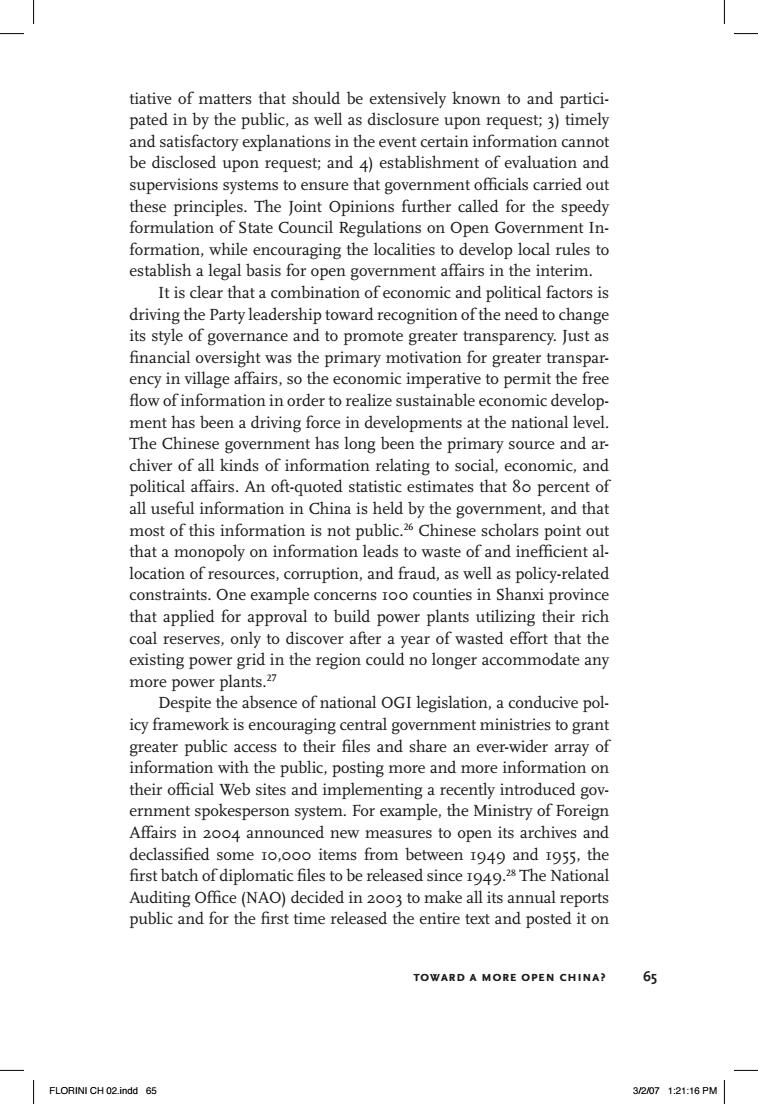正在加载图片...

tiative of matters that should be extensively known to and partici- pated in by the public,as well as disclosure upon request;3)timely and satisfactory explanations in the event certain information cannot be disclosed upon request;and 4)establishment of evaluation and supervisions systems to ensure that government officials carried out these principles.The Joint Opinions further called for the speedy formulation of State Council Regulations on Open Government In- formation,while encouraging the localities to develop local rules to establish a legal basis for open government affairs in the interim. It is clear that a combination of economic and political factors is driving the Party leadership toward recognition of the need to change its style of governance and to promote greater transparency.Just as financial oversight was the primary motivation for greater transpar- ency in village affairs,so the economic imperative to permit the free flow of information in order to realize sustainable economic develop- ment has been a driving force in developments at the national level. The Chinese government has long been the primary source and ar- chiver of all kinds of information relating to social,economic,and political affairs.An oft-quoted statistic estimates that 8o percent of all useful information in China is held by the government,and that most of this information is not public.26 Chinese scholars point out that a monopoly on information leads to waste of and inefficient al- location of resources,corruption,and fraud,as well as policy-related constraints.One example concerns Ioo counties in Shanxi province that applied for approval to build power plants utilizing their rich coal reserves,only to discover after a year of wasted effort that the existing power grid in the region could no longer accommodate any more power plants.27 Despite the absence of national OGI legislation,a conducive pol- icy framework is encouraging central government ministries to grant greater public access to their files and share an ever-wider array of information with the public,posting more and more information on their official Web sites and implementing a recently introduced gov- ernment spokesperson system.For example,the Ministry of Foreign Affairs in 2004 announced new measures to open its archives and declassified some Io,ooo items from between 1949 and 1955,the first batch of diplomatic files to be released since 1949.The National Auditing Office (NAO)decided in 2003 to make all its annual reports public and for the first time released the entire text and posted it on TOWARD A MORE OPEN CHINA? 65 FLORINI CH02indd 65 3/2071:21:16PMtoward a more open china? 65 tiative of matters that should be extensively known to and participated in by the public, as well as disclosure upon request; 3) timely and satisfactory explanations in the event certain information cannot be disclosed upon request; and 4) establishment of evaluation and supervisions systems to ensure that government officials carried out these principles. The Joint Opinions further called for the speedy formulation of State Council Regulations on Open Government Information, while encouraging the localities to develop local rules to establish a legal basis for open government affairs in the interim. It is clear that a combination of economic and political factors is driving the Party leadership toward recognition of the need to change its style of governance and to promote greater transparency. Just as financial oversight was the primary motivation for greater transparency in village affairs, so the economic imperative to permit the free flow of information in order to realize sustainable economic development has been a driving force in developments at the national level. The Chinese government has long been the primary source and archiver of all kinds of information relating to social, economic, and political affairs. An oft-quoted statistic estimates that 80 percent of all useful information in China is held by the government, and that most of this information is not public.26 Chinese scholars point out that a monopoly on information leads to waste of and inefficient allocation of resources, corruption, and fraud, as well as policy-related constraints. One example concerns 100 counties in Shanxi province that applied for approval to build power plants utilizing their rich coal reserves, only to discover after a year of wasted effort that the existing power grid in the region could no longer accommodate any more power plants.27 Despite the absence of national OGI legislation, a conducive policy framework is encouraging central government ministries to grant greater public access to their files and share an ever-wider array of information with the public, posting more and more information on their official Web sites and implementing a recently introduced government spokesperson system. For example, the Ministry of Foreign Affairs in 2004 announced new measures to open its archives and declassified some 10,000 items from between 1949 and 1955, the first batch of diplomatic files to be released since 1949.28 The National Auditing Office (NAO) decided in 2003 to make all its annual reports public and for the first time released the entire text and posted it on FLORINI CH 02.indd 65 3/2/07 1:21:16 PM